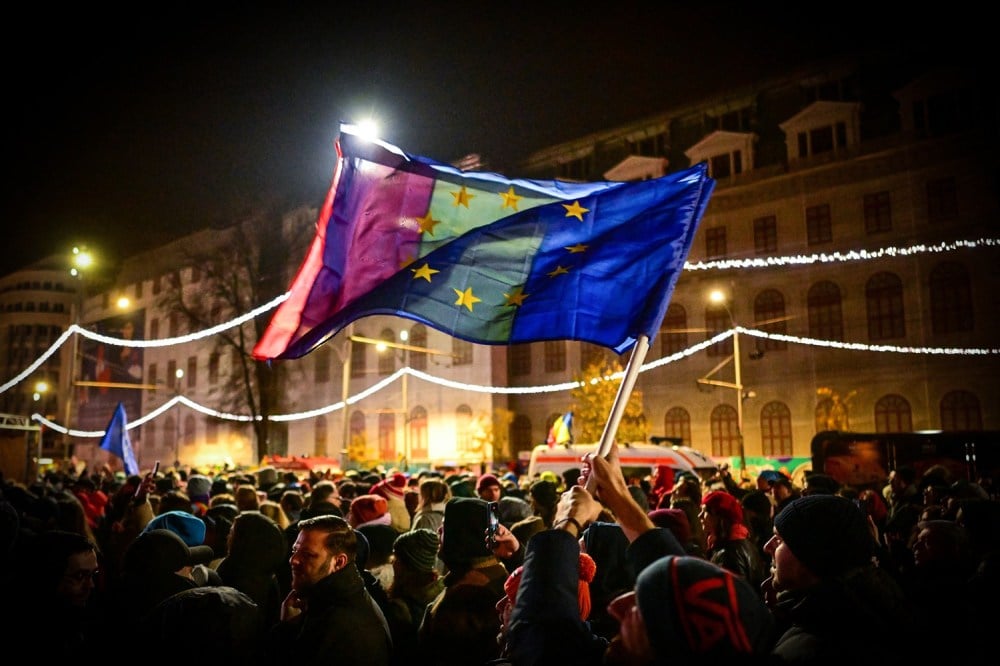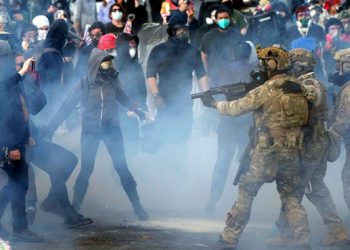As it prepares to hold a rerun of its presidential election on May 4, Romania is improbably at ground zero of a new global struggle. A first effort at balloting in November 2024 was won by a Euroskeptic Kremlin backer after election interference, causing Romania’s Constitutional Court to annul the election, ban the candidate, and prompt a redo.
At the Munich Security Conference in February, U.S. Vice President J.D. Vance sharply criticized Romania’s decision. “Romania straight up canceled the results of a presidential election based on the flimsy suspicions of an intelligence agency,” Vance said.
“You don’t have shared values if you cancel elections because you don’t like the result. … If you’re so afraid of your own people that you silence them and shut them up,” he said in another speech.
Romania’s drama is part of a broader global story: Democratic institutions are being undermined around the world not just by external threats but from within. Elected leaders use the legitimacy of the ballot box to defang judicial oversight, muzzle the press, and eliminate accountability. This is not democracy at work—it is elections being weaponized to eliminate the guardrails that prevent corruption and despotism.
The Constitutional Court—a body whose members are appointed, not elected—embodies the post-communist elite consensus that has shaped Romania’s institutions. Moreover, the country’s two dominant parties, the center-left Social Democrats and center-right National Liberals, which have generally traded power since the fall of communism and are widely viewed as elite pillars, also rallied behind the annulment in horror at the Kremlin-aligned candidate’s success.
Romania’s surge of “elite” intervention—particularly in canceling a Russian-influenced election—has rendered the country an example of what U.S. President Donald Trump and his allies see as a global elite conspiracy to control outcomes and suppress “the people.”
Romania has become a convenient rhetorical battleground for the Trump-aligned campaign against “elites.” But it is the much-besmirched elites who are protecting liberal democracy—in Romania and in many places around the world.
From America’s James Madison to Britain’s John Stuart Mill, the architects of modern democracies believed that liberty and reason needed protection from mob rule. The U.S. Constitution was designed not to reflect every popular impulse but to contain them. The same was true of the Magna Carta, the French Revolution’s “Declaration of the Rights of Man and of the Citizen,” and even the post-communist constitutions of Eastern Europe. All were created not by spontaneous popular will, but by relatively small groups of educated, empowered individuals. Elites, in other words.
Romania’s own transition from dictatorship to democracy—beginning with its 1991 constitution after the Romanian revolution and the collapse of the communist regime—was steered by such figures who laid the groundwork for liberal institutions that endure today. The country’s history produced a deep societal aversion to centralized, unaccountable power, which in turn shaped a generation of reform-minded elites who crafted institutions designed to prevent a return to authoritarianism. Working alongside legal and political experts from around the world, Romanian leaders consciously sought to embed liberal democratic principles into the country’s foundation: separation of powers, judicial independence, multiparty elections, and protections for individual rights. Despite ongoing challenges, Romania’s system remains committed to these guardrails essential to liberal democratic governance.
Crucially, Romania’s European Union and NATO integration processes reinforced these structures by requiring anti-corruption reforms, press freedoms, and civil society engagement. Successive reforms, including EU-aligned anti-corruption drives and press freedoms, were likewise elite-led rather than populist in origin (which, in Romania’s case and others’, was always on the edge).
Unlike the aristocratic and philosophical elites of centuries past, Romania’s modern elites operate in a digital, democratic ecosystem—more visible, more contested, and yet more vital. They are shaped by international educations, think tanks like business magnate George Soros’s Open Society Foundations, and civic initiatives promoting liberalism.
But there are those, such as Russian President Vladimir Putin, who would like nothing more than to turn back the clock. Putin’s motivation is part of a broader strategy to destabilize democratic institutions on NATO’s eastern flank. Romania, as a relatively successful post-communist state deeply integrated into Western alliances, represents precisely the kind of liberal democratic model that threatens the Kremlin’s narrative of inevitable Western decay. Undermining Romania also serves multiple strategic goals: testing EU resolve, fracturing unity in Eastern Europe, and sowing distrust in electoral processes. It’s a low-cost, high-yield theater for Russia’s hybrid warfare—especially in an election cycle vulnerable to digital manipulation.
In late 2024, these dynamics reached a crisis point. A fringe ultranationalist and conspiracy theorist named Calin Georgescu stunned observers by winning the first round of Romania’s presidential election propelled by a last-minute explosion of TikTok-driven disinformation. Internal investigations by TikTok later revealed a coordinated network of about 4,500 accounts, though separate Romanian reports claim the number of involved accounts was far higher, perhaps 25,000. Reports based on Romanian intelligence say many of them are tied to Russian influence operations, and they generated tens of millions of impressions in the final days of the campaign.
Romanian prosecutors, according to Bloomberg, requested assistance from Turkish authorities to investigate over 20,000 TikTok accounts. These accounts used Turkish IP addresses and were created with Russian email domains shortly before the Romanian election.
The Kremlin denied any election meddling.
The narrative promoted in the TikTok videos was a familiar stew of anti-elitism, vaccine paranoia, and Kremlin-aligned talking points favoring the far-right candidate. Videos cast Georgescu as the only candidate who “cares about real Romanians” amid a national moral decline and promised to “give the country back to the people.”
Faced with a foreign-influenced online disinformation campaign, Romania’s Constitutional Court took the extraordinary step of annulling the results, later barring Georgescu from the next round of voting. Additionally, the National Authority for Management and Regulation in Communications of Romania (ANCOM), invoked the European Union’s Digital Services Act (whose purpose is to regulate online platforms to ensure a safer, more transparent, and accountable digital environment). The body demanded algorithmic transparency from platforms, and Romanian officials called for TikTok access to be suspended, although the ban was never put in place.
All this triggered outrage across Trump-aligned circles in the United States and abroad who accused Romania’s elites of canceling the will of the people, including Vance, former White House chief strategist Steve Bannon (who met recently with George Simion, another Romanian ultranationalist), and Hungarian Prime Minister Viktor Orban, who said Romania was useful as a case study in how to avoid social media campaigns that might provide courts with “a pretext to annul” elections.
The richest person in the world and fervent Trump ally, Elon Musk himself, weighed in, reposting a photo of Pavel Popescu, vice president of ANCOM, with the caption: “You can tell who the bad guys are by who is demanding censorship.” But this was not censorship. It was an intervention to safeguard a democratic system under digital siege.
Romania’s so-called elites—including constitutional scholars, anti-corruption prosecutors, liberal politicians, and journalists, many of whom were educated in Western institutions and remain committed to democratic norms—did not impose authoritarian rule. Indeed, some of them can be credited for correcting the outcome of an election desperately corrupted by foreign interference. They enforced the law. They exercised judgment. In short, the system moved to protect itself from manipulation.
As the May election nears, concerns remain about renewed interference, but the elite-led response has restored some public confidence. Without Georgescu in the running, Simion leads opinion polls, averaging around 30 percent. Behind him is Social Democratic Party and National Liberal Party candidate Crin Antonescu, who is polling at 24 percent. While a Simion win could cause concern for EU leaders, it’s worth noting opinion polls did not predict Georgescu’s victory in the last election attempt.
“Liberal democracy” is not merely the act of electing leaders, but a system defined by the rule of law, checks and balances, protections for minorities, an independent judiciary, and a free press. It is the belief that even majorities and elected leaders must be constrained by principles.
This is the moment when those who still believe in liberal democracy must step up—journalists and educators, judges and public servants, scientists and philanthropists, and also business leaders who care about more than just the bottom line. In Romania, that has meant using EU law to demand transparency from tech platforms and cancel tainted elections, whatever their result. In the United States, it could mean embracing civic education and media literacy while resisting populist pressure to gut institutions.
Either way, in these two countries and whatever the results of their next elections, there will always be an important role for the “elites” in maintaining liberal democracy.
The post ‘Elites’ Are Protecting Liberal Democracy in Romania appeared first on Foreign Policy.




